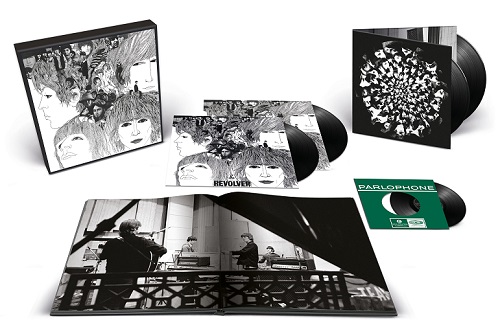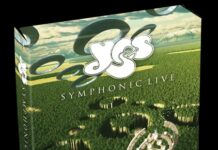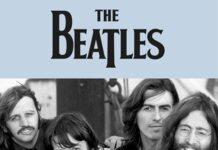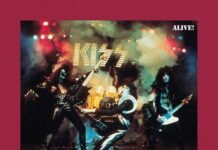There’s been a long-running debate about which Beatles album is the greatest, and it usually comes down to Revolver and Sgt. Pepper’s Lonely Hearts Club Band — for entirely different reasons. Revolver was a step away from the normal range of love songs, utilizing a menagerie of crazy ideas, sound effects, percussion, odd instruments and tape loops. Sgt. Pepper’s Lonely Hearts Club Band transcended the organic glimmer of Revolver, pushing the Beatles to grandiose heights of grandeur — right at the dawn of 1967 and the Summer of Love. It may be fair to say that without Revolver, it’s doubtful there would have been a Sgt. Pepper’s Lonely Hearts Club Band. The Special Edition of Revolver is all the evidence you need.
The Special Edition — available as a five-CD or four-LP (with an extra EP) boxset, a Super Deluxe double CD set, or digitally — includes the 14-track Revolver album in its original 1966 mono format, as well newly remixed stereo and Dolby Atmos versions produced by Giles Martin and engineered by Sam Okell — the same pair responsible for Special Editions of Sgt. Pepper’s Lonely Hearts Club Band (2017), The BEATLES (‘White Album’) (2018), Abbey Road (2019), and Let It Be (2021). The EP features “Paperback Writer” and “Rain” in both mono and the new stereo mix. While audiophiles may be disappointed by the absence of a 5.1 surround mix, they’ll find comfort in the Sessions discs filled with alternate takes and mixes of every one of the album’s songs except “Good Day Sunshine,” one of the quickest recordings on Revolver with its first take and numerous overdubs making the final cut.
Of course, no Special Edition set would be complete without the addition of a few words and images, and Revolver delivers on that front with a 100-page hardbound book in the boxset, and an abridged 40-page booklet in the Super Deluxe set. Here, you’ll read thoughts from Paul McCartney, Giles Martin, Questlove, and noted Beatles historian Kevin Howlett. You’ll also get insights into each track, a fun graphic novel tracing the origins of the famous, Grammy-winning cover by Klaus Voorman, and a short history lesson on how the world reacted when Revolver dropped on August 5, 1966 — a week before the final Beatles tour. There are also rare and previously unpublished photos, images of handwritten lyrics, tape boxes, recording sheets, and print ads from the period.
For Revolver, McCartney worked it on a few different fronts — going long with more sophisticated, orchestrated pieces like “Eleanor Rigby” and “For No One,” while turning out light-hearted fare such as “Good Day Sunshine” and “Got To Get You Into My Life” that sparkle with optimistic charm. John Lennon was more intent on instilling a hallucinogenic spin via “She Said She Said,” “Doctor Robert” and “Tomorrow Never Knows.” And George Harrison stepped up his songwriting game with three songs on the album (a first) — crushing it with the hard-hitting “Taxman” aimed at the UK’s tax rate, then bringing in the classical Indian music influence on “Love You To,” and keeping it in the cusp for “I Want To Tell You. ” One spin through either the stereo or mono Revolver album, and you’ll be overjoyed by the variety and power, and understand why it’s been called a “pop masterpiece” by critics and fans, alike.
For those looking for more, the Sessions discs are brimming with oddities and curiosities. “Tomorrow Never Knows” — named after one of Ringo Starr’s frequent malapropisms (“A Hard Day’s Night” is another one) and, up to that point, the Beatles’ most experimental track — was actually the first song recorded for Revolver. The first take is radically basic and sparse compared to the finished product, which the mono mix that follows closely resembles. Lennon found inspiration in a psychedelic guide to The Tibetan Book Of The Dead for the lyrics, while Starr’s modulated drumming, numerous tape loops, Harrison’s sustained tamboura and backwards guitar solo, and the singer’s ADT-treated vocals push the song forward into unexplored territory. Elsewhere, previously unreleased takes of “Got To Get You Into My Life,” “Paperback Writer” and “And Your Bird Can Sing” reveal different arrangements, vocal harmonies, instruments, keys, tempos, and, in the case of “Yellow Submarine,” a different lead singer. Yes, when the song was first put together with different lyrics, Lennon can be heard, strumming an acoustic and singing the familiar “In the town where I was born” followed by the unfamiliar “no one cared.” It took McCartney’s idea of turning it into a children’s song and having Starr sing it to transform “Yellow Submarine” into a beloved sing-along that eventually lent its name to an innovative animated film two years later.
The combination of improved audio and unreleased takes lavishly packaged and presented in various configurations serves as a constant reminder of the Beatles and their impact. Like its predecessors, the Special Edition of Revolver has already elicited excitement and wonder among seasoned and unseasoned Beatlemanics, alike. And now that all the albums from the group’s most fertile period have been thoroughly vetted and publicly shared, what could possibly come next? A lot of folks speculate 1965’s Rubber Soul, the first Beatles album to mark a real departure from the norm, is the most obvious choice. Chances are that Giles Martin and his team are already working on a follow-up. Whatever happens, a large contingency of music fans will be there to carry on the legacy of the greatest rock and roll band in history with no end in sight.
~ Shawn Perry




















